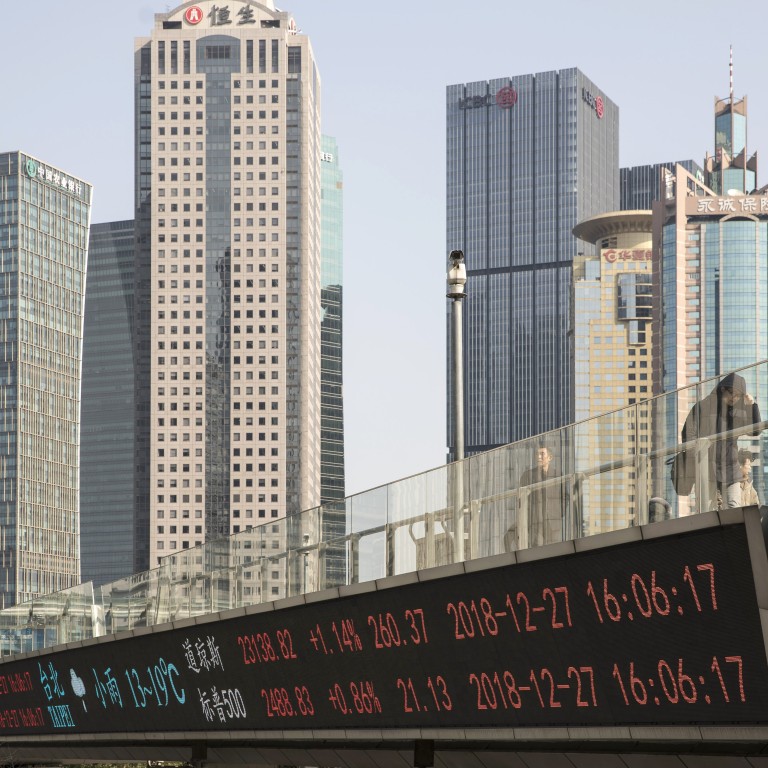
Every time Chinese stocks are this cheap they spend the next year soaring, says AllianzGI boss
- On the last three occasions the price-to-book ratio has been this low, A shares have produced gains averaging 55 per cent, says Andreas Utermann, CEO of AllianzGI
- The relaxation of restrictions on foreign investment will also help the market bounce back, he says
Now is the time to invest in China’s domestic stock market if history is any guide, according to the head of Allianz Global Investors (AllianzGI), one of Europe’s biggest asset managers.
Andreas Utermann, chief executive of AllianzGI, said low valuations in the so-called A-shares market and the relaxation of restrictions on international investors mean a strong rally is on the cards.
After the country’s benchmark Shanghai Composite Index shed a quarter of its value last year, it is now at a level which historically has always tended to precede a sharp rise, he said in an interview with the South China Morning Post in Hong Kong during a recent visit.
The price-to-book ratio for the MSCI China A-share index has started the year at 1.54 times, close to its historic low of 1.47 times in 2014.
Utermann said the last three times since 2005 when the price-to-book ratio breached 1.6 times, the index has gone on to enjoy big gains in the following 12 months. In fact the average annual total return on those occasions has been an impressive 55 per cent.

So far this year his theory has been vindicated. The Shanghai Composite Index has bounced back by 3.6 per cent in January.
While the trade war will ensure the Chinese economic environment remains challenging in the first half of this year, Utermann is positive about full-year growth.
“The Chinese government has introduced a lot of counter-cyclical measures such as monetary easing and tax cuts to support economic growth,” he said.
In addition, he said, Beijing’s recent efforts to open up its financial markets more to foreign investors would attract more funds into A shares this year.
On January 14, the government doubled the combined quota under the “qualified foreign institutional investors” (QFII) scheme to US$300 billion effective immediately.
Previous measures include the establishment of stock-connect schemes linking Hong Kong’s market with those of Shanghai and Shenzhen.
“China’s stock markets were once notoriously difficult to access, but it is encouraging to see the government has made a concerted effort to open its markets, including launching the stock connect programmes,” he said.
“We are seeing many global institutions seeking to increase their exposure to China, and a lot of international funds flowing into A shares after they were included in the MSCI emerging markets index last year.”
The net buying of A shares by international investors through the two stock connect schemes last year was up 50 per cent to a record US$44.7 billion, according to a BNP Paribas report released earlier this month.
They accounted for 5 to 10 per cent of the daily turnover in 2018, compared with just 1 per cent at the beginning of 2017, the BNP report said.
AllianzGI, which manages more than €530 billion (US$609.76 billion) worldwide, is part of German insurance giant Allianz Group which in November became the first foreign insurer to be approved by Beijing to set up a wholly-owned holding company in Shanghai.
“China is a strategically important market for Allianz Group and AllianzGI, and it is central to our growth strategy in Asia. The approval for us to set up a wholly owned holding company will definitely benefit our future growth in China,” he said.
In last three years, Allianz GI’s assets under management in the Asia-Pacific region has increased from €8 billion euro to €58 billion.
“Our Asian business is growing faster than in other regions. We will continue to invest in markets that are strategically important to us,” he said.
The company has operations in Hong Kong, China, Japan, Taiwan and Singapore in the region. In Hong Kong, it is a major investment manager in the Mandatory Provident Fund, the city’s compulsory retirement scheme.

